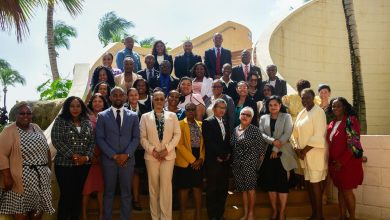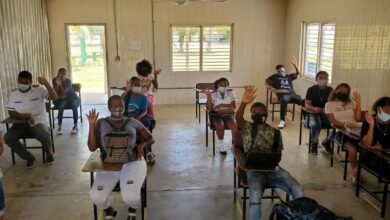The Caribbean Community (CARICOM) Secretariat is advancing efforts to achieve clearer alignment, coordination and harmonization of standards for the teaching profession in the Region.
Earlier this month, over 150 education stakeholders throughout the education eco-system met in a virtual forum titled Quality Teaching and Learning: Conclave of Best Practices in CARICOM Member States.
The discussion saw a robust exchange of ideas for the professionalisation of teaching and for quality learning in CARICOM. It formed part of the implementation of the project: Fostering Educational Quality in CARICOM – Establishing Regional Standards for Educational Practices, supported by the government of Japan, through the Japan-CARICOM Friendship and Cooperation Fund.
Through the project, the CARICOM Secretariat is facilitating support to Member States as they align national standards to the CARICOM Standards for the Teaching Profession. A consultant, Dr Barbara Reynolds, is leading the technical work with Member States.
According to the Programme Manager for Human Resource Development with the CARICOM Secretariat, Dr Laurette Bristol, the discussion on October 8 follows bi-lateral and regional engagements on developments in establishing those standards. They revealed that Member States and Associate Members are making significant strides, but at varying levels of progress, with Jamaica as the forerunner. It has established a Teaching Council that is responsible for standard setting and the regulation of the profession, targeted professional development and guiding policy formation in relation to the wellbeing of teachers.
Dr Bristol recalled that in 2010, the Council for Human and Social Development commissioned a CARICOM Task Force on Teaching and Teacher Education to develop a regional framework to establish Teaching Councils at the national and regional levels.
COHSOD anticipated that the Councils would be autonomous bodies set up to promote the professional development of teachers while regulating and building the competency of the profession.
Even as the efforts continue towards the establishment of national and regional teaching councils, the Meeting Friday last, benefitted from discussions based on the experiences of Barbados, The Bahamas, Jamaica, St. Kitts/ Nevis, Anguilla and the Turks and Caicos as in the pursuit of a quality education system.
Speaking at the opening of the session, Director for Human and Social Development at the Caribbean Community (CARICOM) Secretariat, Ms Helen Royer said the COVID-19 pandemic has illuminated the value of good teachers and has mandated the need for investments to strengthen capacities within the teaching profession.
“Quality teaching is not possible without the creation of enabling conditions at both the system and school level,” she stated.
She said the project concludes in December 2021 with policy interventions that can only be meaningful through structures, which support connectivity and communication across the education system.
Senator Dr Rommel Springer speaking on behalf of The Hon Santia Bradshaw, Minister of Education of Barbados noted that the meeting was timely considering the challenges to quality education that the COVID-19 Pandemic exacerbated.
He said quality education is an issue that has confronted practitioners for decades, referencing the 2000 Dakar Framework for Action that outlined goals for improving every aspect of the quality of education. Senator Springer said a progress report in 2015 revealed that there were significant improvements in access to education, but quality was still not up to scratch. He said the United Nations Sustainable Development Goal 4 renewed the emphasis on quality education internationally, while the CARICOM Human Resource and Development 2030 Strategy articulated the regional vision for equitable, quality education.
Senator Springer underscored Barbados’ commitment to pursuing the ideals of the CARICOM HRD Strategy, even as he acknowledged that the COVID-19 pandemic and the transition to online learning dictated that emphasis be placed mainly on access to education.
With COVID-19 still lingering, he said Barbados has had to “find a way to not just focus on access, but to return to that focus on quality.”
He reported that in April 2021, the country appointed a Director of Education Reform and established a unit to rationalise the systemic education reform identified in the CARICOM HRD Strategy. The country has also begun to respond to the HRD vision for “competency-based curricula that address the 21st century literacies and skills” by disseminating a Coding and Robotics curriculum to accompany over 1000 kits distributed to schools. He added that this initial investment received a boost from a gift of 72 solar robotic kits from the European Union, recently.
“Taken together with the ongoing training of teachers in Coding and Robotics, I believe that Barbados is slowly moving in the direction that will poise our education system for post-COVID recovery and growth,” Senator Spring told the meeting.
Lauding the forum, he said it signaled that despite the challenges confronting the Region, it is committing to the quest for quality, and taking the desired unified and coordinated approach towards achieving it.






